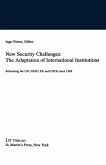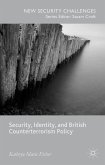The Alliance has endeavoured to identify a new raison d'être since 1991, but no unifying set of priorities has surfaced. In the absence of a menace to their vital interests, and with fundamental policy differences dividing North America and Europe, NATO is succumbing to the pressure of the times.
Hinweis: Dieser Artikel kann nur an eine deutsche Lieferadresse ausgeliefert werden.
Hinweis: Dieser Artikel kann nur an eine deutsche Lieferadresse ausgeliefert werden.
'NATO after 9/11: An Alliance in Continuing Decline is the most important book on the transatlantic relationship to appear in the past decade. Richard Rupp builds a compelling case that the expanded version of NATO, focused on missions outside of Europe, exhibits only superficial health. The underlying reality is an alliance that lacks cohesion and increasingly lacks the capability to act effectively even when there is general agreement on a policy initiative.This meticulously researched, clearly written book is must reading for anyone interested in the future of NATO.' - Ted Galen Carpenter, Vice President, Defense and Foreign Policy Studies, Cato Institute
'Since the end of the Cold War, endless editorials and journal articles have superficially fuelled the 'NATO is dead' thesis. With Rupp's important work, we finally have a scholarly and densely argued book which submits that thesis to a rigorous scrutiny. Rupp's analysis is searching and sophisticated, comprehensive and coherent. This is not the loaded logic of the isolationist, the pacifist or the neo-conservative. Nor is it an autopsy. It is the honest and reluctant, but nevertheless categorical, conclusion of a NATO insider who does not balk at making an unwelcome case: put simply, that NATO is increasingly peripheral to the security requirements of its member states. For all those interested in transatlantic relations, international security and Alliance transformation, Rupp's book must be required reading.' - Jolyon Howorth, Yale University
'Since the end of the Cold War, endless editorials and journal articles have superficially fuelled the 'NATO is dead' thesis. With Rupp's important work, we finally have a scholarly and densely argued book which submits that thesis to a rigorous scrutiny. Rupp's analysis is searching and sophisticated, comprehensive and coherent. This is not the loaded logic of the isolationist, the pacifist or the neo-conservative. Nor is it an autopsy. It is the honest and reluctant, but nevertheless categorical, conclusion of a NATO insider who does not balk at making an unwelcome case: put simply, that NATO is increasingly peripheral to the security requirements of its member states. For all those interested in transatlantic relations, international security and Alliance transformation, Rupp's book must be required reading.' - Jolyon Howorth, Yale University








